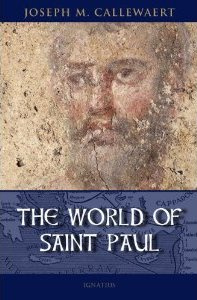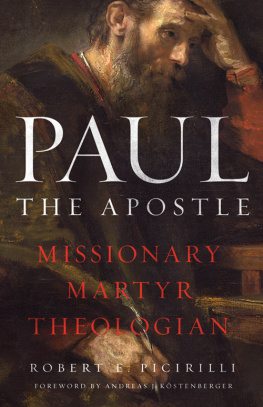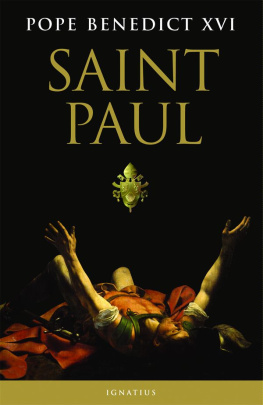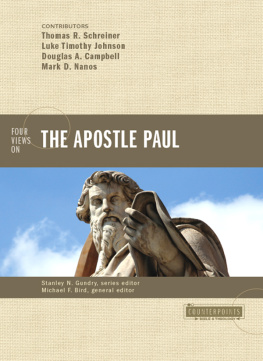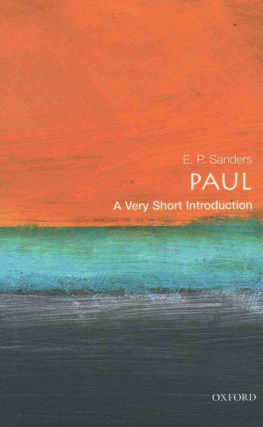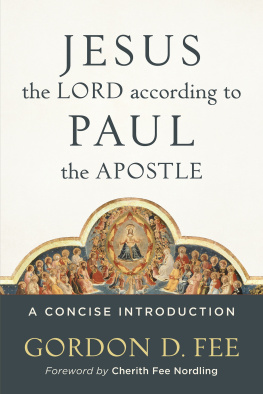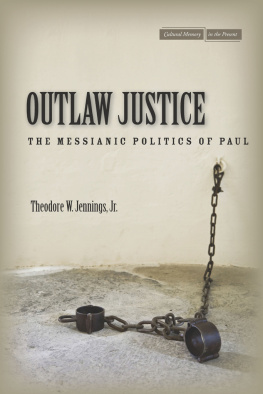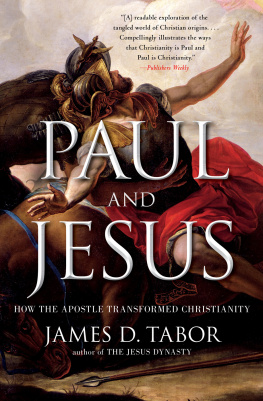JOSEPH M. CALLEWAERT
THE WORLD OF SAINT PAUL
Translated by Michael J. Miller

IGNATIUSPRESS SAN FRANCISCO
Original French text: L'Univers de l'Apotre Paul
Unlessotherwise noted, Scripture quotations have been taken from the Revised StandardVersion of the Holy Bible, Second Catholic Edition, 2006. The RevisedStandard Version of the Holy Bible: the Old Testament, 1952, 2006; theApocrypha, 1957, 2006; the New Testament, 1946, 2006; the Catholic Editionof the Old Testament, incorporating the Apocrypha, 1966, 2006, the CatholicEdition of the New Testament, 1965, 2006 by the Division of ChristianEducation of the National Council of the Churches of Christ in the UnitedStates of America.
All rightsreserved.
Cover image: The Apostle Paul Impogeodegli Aurelii, Rome, Italy
Photograph byG. Dagli Orti DeA Picture Library/Art Resource
Cover designby Roxanne Mei Lum
Maps by DavidNotley Camway Creative Limited
2011 byIgnatius Press, San Francisco All rights reserved ISBN 978-1-58617-412-5
Library ofCongress Control Number 2010931313
Printed inthe United States of America
To mybrother, Fr. Lucien Callewaert, C.Ss.R. Sacerdos Sanctae Ecclesiae fidelissimus
CONTENTS
Antioch (in Syria)
The First MissionaryJourney
The Second MissionaryJourney
Corinth and SurroundingArea
Ephesus and Surrounding Area
The Third MissionaryJourney
Final Stage of the Journey to Rome
PREFACE
He [Saint Paul] is a chosen instrument of mineto carry my name before the Gentiles and kings and the sons of Israel; for Iwill show him how much he has to suffer for the sake of my name.
(Acts 9:15-16)
This book began in my mind on a beautifulItalian day, a few years ago, as I was visiting the Basilica of San Paolo fuorile Mura, that imposing church "outside the walls" of Rome, so chargedwith memory. It stands on the Via Ostiense and holds the body of Saint Paul,which the emperor Constantine, early in the fourth century a.d., encased in a double sarcophagus of marble andbronze. It was here, as I was contemplating the beautiful canopy of Arnoldo diCambio (1285) under which rests the apostle, that I began reflecting how littleaverage Christians know about Saint Paul and his times. Realizing that fewbooks offer a style and a format accessible to them, I decided to write justsuch a book.
This biography of Saint Paul is addressed to amainstream audience of Catholics and Christians as well as other people of goodwill, who want to walk with a man who was totally available to the guidance ofthe Holy Spirit in his missionary journeys through the Greco-Roman world.
Across the East Mediterranean, the reader willfollow the apostle closely: in the heart of the Syrian desert; on the highplateaus of arid Anatolia; in the Riviera of Pamphylia; along the coast ofCyprus; sailing around the jagged islands of the sun-drenched Aegean and Ionianseas; in the fertile plains of Macedonia; up the tormented coastline of Achaia.Everywhere they will listen to or read the gospel, always new, that the apostlePaul came to announce to the Jews and the Gentiles, in the synagogues andpublic places, two thousand years ago.
In my interpretation of Saint Paul, I have triedto absorb the spirit of his epoch as far as I could, and I put less trust inthe present-day judgments, however brilliantly and learnedly expressed, than inthe abiding traditions of the ages. If perhaps I have evoked a little too muchhistory and pursued rather too long a road in regions so rich with a past, Ihave always made sure to trace a path that brings us back to this intrepid andtenacious Jew who will steadily appear in stark relief.
I have passed through the pale antechambers of"research" guided by reason and conscience, but well aware that eachone of us, even an historian or exegete, is enveloped in the fashion of histimes and his temperament. There is nothing in all this for humble people to fear,as if failure to accept the latest result of "biblical criticism"should immediately class one as an ignoramus. There is the authority ofscholarship and there is also the authority of tradition, based on informationaccessible to us and sanctioned by the Church.
Of the authorities (one must have"Authorities") by whose lights in varying degrees I have been guided,I give a list in appendix. It is not as exhaustive as I wish, for it would fillanother hundred pages, so rich and numerous are the bibliographic sourcesdealing with the apostle.
Before the invention of the printing press, whenan exhausted scribe finished copying the Holy Bible or a treasured book or avaluable document, he exclaimed: Deo gratias! Saint Paul, however, gave me cause for thanksgivingfrom the start: writing this book began in a glow of pleasure, continued andended with great delight.
Deo Gratias!
In These Last Days
Before entering upon the life of Saint Paul, letus consider how in his era the world had become a field well-suited toreceiving and propagating the good news, the euangelion, of Jesus Christ. "In many and various ways Godspoke of old to our fathers by the prophets; but in these last days he has spoken to us by a Son, whom heappointed the heir of all things, through whom also he created the ages"(Heb 1:12; italics added). And this Son, the Christ, commanded his disciples:"[Go] ... And you shall be my witnesses in Jerusalem and in all Judea andSamaria and to the end of the earth" (Acts 1:8).
Theworld of the first century of our era had been prepared providentially toreceive this gospel as a result of several favorable circumstances, which wewill review quickly.
The Diaspora of the Jews
By 721 b.c. Sargon II of Assyria had taken more than twenty-seven thousand inhabitants ofSamaria away in captivity to Asshur. At the same time a large number ofIsraelites from the same region took refuge in Egypt (see Hos 9:6).
Nearly one and a half centuries later, in Juneto July 587, Jerusalem was captured, the Temple was destroyed byNebuchadnezzar, and a new deportation ensued. This caused a new influx ofrefugees in the land of the Nile, bringing with it the prophet Jeremiah,against his will.
Following the conquests of Alexander the Great,Greek became the lingua franca of almost the entire ancient East. The books ofthe Old Testament were translated into Greek, the Septuagint (LXX), for thebenefit of the Hellenized Jews of Alexandria in Egypt. In 233 b.c., Antiochus IV Epiphanes colonized the entirecoast of Asia Minor with emigres, most of them Jewish, who were originally fromBabylon and Palestine.
In 63 b.c. Pompey, the famous Roman general, brought some Jews as captives to Rome. Laterthese Romanized Jews provided Julius Caesar with funds to help him in his riseto power. In return, in 47 b.c. Caesar promulgated a decree worded as follows: "Hyrcanus and his sons willpreserve all their rights to the title of high priest, whether it be granted tothem by law or by a free gift. If, subsequently, a question arises concerningJewish polity, I desire that it be settled by referring it to him." Thedecree continues: "All other measures notwithstanding, I allow thesepersons [the Jews] to gather and to organize their community following thecustoms of their fathers and according to their own laws." This favorabledecree of Julius Caesar was approved after his death by the Senate of theRepublic and later by Caesar Augustus also.
Next page
